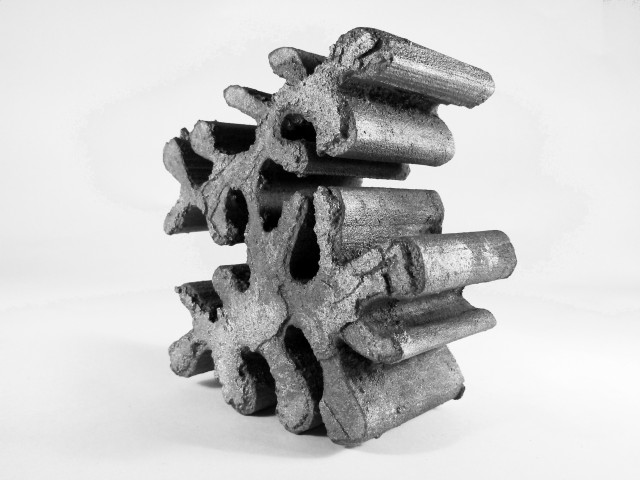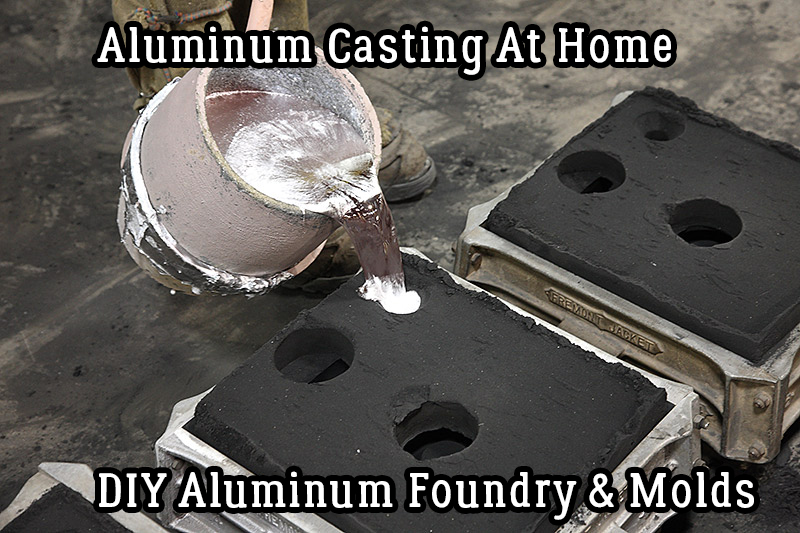Recognizing the Benefits and Innovations in the Aluminum Foundry Industry
The Aluminum Foundry industry plays a vital function in modern production. Its light-weight buildings notably enhance fuel efficiency, particularly in automobile and aerospace industries. Additionally, Aluminum's resistance to rust assurances durability in various applications. As the industry evolves, innovations such as advanced recycling and additive production are improving manufacturing techniques. Checking out these improvements discloses not just the advantages however also the challenges in advance for Aluminum shops in a swiftly transforming market.
The Lightweight Benefit of Aluminum
Aluminum's lightweight nature provides considerable advantages across various industries, particularly in production and transport. Its low thickness enables for the production of components that are easier to set up and handle, causing minimized labor costs and enhanced performance. In the automobile sector, lighter lorries add to improved gas economic climate and lower exhausts, aligning with international sustainability objectives. Similarly, in aerospace, using Aluminum minimizes the overall weight of aircraft, which is critical for boosting performance and reducing operational prices.
Additionally, Aluminum's lightweight homes help with innovative layouts that were previously unfeasible with larger products. This flexibility enables suppliers to develop complicated shapes and frameworks while preserving architectural stability. Overall, the light-weight advantage of Aluminum not just improves item performance however also drives developments in innovation and layout, making it a favored product in numerous applications.
Corrosion Resistance and Toughness
The Aluminum Foundry industry is renowned for producing materials with remarkable deterioration resistance, making them ideal for various applications. This property, combined with enhanced structural integrity, contributes to the lasting performance advantages that Aluminum elements use. As an outcome, industries significantly count on Aluminum to meet demanding ecological problems without endangering top quality.
Superior Deterioration Resistance
While numerous steels encounter substantial obstacles from ecological aspects, Aluminum stands out for its superior deterioration resistance, making it a recommended selection in lots of applications. This property is primarily due to a natural oxide layer that forms on the Aluminum surface, supplying a barrier against wetness and destructive representatives. Unlike other metals that might corrosion or deteriorate with time, Aluminum keeps its stability even in harsh settings, such as industrial setups or coastal areas. In addition, its lightweight nature combined with deterioration resistance makes it suitable for applications in aerospace, vehicle, and marine sectors. In general, Aluminum's exceptional durability not just enhances item durability yet also minimizes maintenance prices, providing an engaging advantage for consumers and makers alike.
Enhanced Architectural Integrity
Designers and designers progressively identify the significance of boosted structural honesty in contemporary applications, where both deterioration resistance and sturdiness are crucial. Aluminum alloys, recognized for their lightweight homes, additionally exhibit phenomenal resistance to corrosion, making them ideal for severe settings. The innovative methods used in the Aluminum Foundry industry add substantially to producing parts with improved sturdiness. Advanced casting procedures and alloy compositions are tailored to satisfy certain efficiency needs, guaranteeing that frameworks can hold up against extreme conditions without compromising stability. Surface area treatments and finishings boost the life-span of Aluminum items, better minimizing deterioration over time. This focus on enhanced structural integrity not only expands the use of products yet additionally minimizes upkeep expenses, solidifying Aluminum's position as a material of choice in numerous sectors.
Long-lasting Efficiency Conveniences
Durable efficiency in Aluminum elements is mostly associated to their remarkable rust resistance and toughness. Unlike lots of metals, Aluminum naturally creates a safety oxide layer, which stops rust and wear and tear in numerous settings, including marine and commercial setups. This integral residential or commercial property considerably expands the life-span of Aluminum products, decreasing upkeep and replacement prices. Furthermore, the light-weight nature of Aluminum improves its applicability across sectors without jeopardizing toughness. The product's resistance to damage additionally adds to its integrity sought after applications, making it an optimal choice for auto, aerospace, and building sectors. As markets increasingly focus on sustainability and longevity, Aluminum's efficiency advantages line up with modern-day engineering demands, solidifying its duty in innovative production processes.
Environmental Influence and Sustainability
 As the Aluminum Foundry sector evolves, it progressively focuses on ecological impact and sustainability, acknowledging the demand for responsible practices when faced with environment adjustment. Efforts to lessen waste and power intake go to the center, with several foundries embracing recycling efforts to recover Aluminum scrap. This not just lowers raw material usage but also significantly reduces down power expense, as recycled Aluminum calls for just a portion of the power contrasted to primary production.
As the Aluminum Foundry sector evolves, it progressively focuses on ecological impact and sustainability, acknowledging the demand for responsible practices when faced with environment adjustment. Efforts to lessen waste and power intake go to the center, with several foundries embracing recycling efforts to recover Aluminum scrap. This not just lowers raw material usage but also significantly reduces down power expense, as recycled Aluminum calls for just a portion of the power contrasted to primary production.Additionally, innovations in exhausts regulate modern technologies are being implemented to decrease air pollutants, aligning procedures with more stringent ecological guidelines. Foundries are additionally discovering alternate power sources, such as solar and wind, to power useful source their facilities sustainably. By cultivating cooperation with stakeholders, the sector intends to establish ingenious services that improve environmental stewardship. Collectively, these efforts highlight a commitment to decreasing the Aluminum Foundry's carbon footprint while promoting a round economic situation within the production industry.
Advanced Manufacturing Techniques
 Revolutionizing manufacturing processes, the Aluminum Foundry sector is increasingly incorporating advanced production techniques to improve performance and precision. Strategies such as computer numerical control (CNC) machining and additive production have emerged as essential elements in optimizing manufacturing operations. CNC machining enables for high-precision element fabrication, substantially reducing product waste and manufacturing time. Meanwhile, additive production opens up brand-new avenues for complicated geometries and light-weight layouts that were previously challenging to attain.
Revolutionizing manufacturing processes, the Aluminum Foundry sector is increasingly incorporating advanced production techniques to improve performance and precision. Strategies such as computer numerical control (CNC) machining and additive production have emerged as essential elements in optimizing manufacturing operations. CNC machining enables for high-precision element fabrication, substantially reducing product waste and manufacturing time. Meanwhile, additive production opens up brand-new avenues for complicated geometries and light-weight layouts that were previously challenging to attain.Additionally, the deployment of automation and robotics in Aluminum factories simplifies procedures, minimizes human error, and enhances employee safety and security. These technologies assist in an even more responsive production environment, allowing manufacturers to adapt swiftly to market needs. The combination of sophisticated simulation software application better enhances the style and testing phases, leading to remarkable item high quality. Collectively, these methods not only enhance operational effectiveness yet additionally foster innovation, positioning the Aluminum Foundry sector at the center of modern manufacturing.
Technologies in Recycling Processes
The Aluminum Foundry sector is not just progressing in making methods but is additionally making substantial strides in recycling processes. Technologies are emerging to enhance the performance of recycling methods, lowering energy consumption and boosting sustainability. Advanced arranging technologies, such as automated optical sorting, make it possible for the identification and separation of Aluminum from various other materials with high accuracy. This brings about a better of recycled Aluminum, which is crucial for maintaining the honesty of the final items.
Closed-loop recycling systems are being implemented, enabling manufacturers to reuse Aluminum scrap within their very own production processes. This decreases waste and promotes a round economic situation. Furthermore, research study right into new recycling methods, such as hydrometallurgical procedures, uses the potential for recouping Aluminum from intricate waste streams. These advancements not just add to minimizing the carbon footprint of the Aluminum Foundry market however also bolster its financial practicality in an increasingly ecologically conscious market.
Applications Across Numerous Industries
Many industries are significantly identifying the adaptability and benefits of Aluminum Foundry products, bring about prevalent applications across fields such as auto, aerospace, building, her comment is here and consumer products. In the vehicle sector, Aluminum spreadings add to light-weight car styles, enhancing gas efficiency and efficiency. Aerospace producers utilize Aluminum components for their strength-to-weight ratio, crucial for aircraft structures and parts.
In building, Aluminum is favored for its resilience and resistance to deterioration, making it perfect for window structures, roof, and architectural assistances. Consumer items likewise benefit from Aluminum Foundry products, as seen in kitchenware, electronics, and product packaging, where lightweight and recyclable materials are important.
The adaptability of Aluminum Foundry techniques permits specific requirements and elaborate layouts, dealing with the diverse requirements of these markets. Consequently, Aluminum Foundry items are becoming essential to modern-day manufacturing procedures throughout various fields.
Future Trends in Aluminum Foundries
As industries proceed to evolve, Aluminum shops are poised to welcome a number of key trends that guarantee to improve efficiency and sustainability. One famous pattern is the raising fostering of electronic technologies, consisting of automation and man-made knowledge, which improve procedures and enhance quality assurance. On top of that, the press towards sustainable techniques is leading shops to buy recycling technologies, significantly lowering waste and power consumption.
 An additional arising trend is making use of sophisticated alloys and materials, accommodating the expanding need for lightweight and durable components throughout various industries (Aluminum Foundry). The combination of additive manufacturing methods is prepared for to change component layout, offering customization and decreasing lead times.
An additional arising trend is making use of sophisticated alloys and materials, accommodating the expanding need for lightweight and durable components throughout various industries (Aluminum Foundry). The combination of additive manufacturing methods is prepared for to change component layout, offering customization and decreasing lead times.Partnership with research organizations is likewise expected to drive development, as factories seek to establish new processes and materials. Aluminum Foundry. Collectively, these trends indicate a transformative future for the Aluminum Foundry industry, aligning with broader objectives of sustainability and efficiency
Frequently Asked Questions
What Are the Typical Prices Connected With Aluminum Foundry Manufacturing?
The regular prices related to Aluminum Foundry manufacturing consist of basic materials, labor, energy, equipment maintenance, and overhead expenditures. These elements collectively affect the overall monetary investment needed for effective Aluminum spreading operations.
Just How Does Aluminum Compare to Other Metals in Stamina?
Aluminum, while lighter than many steels, displays remarkable strength-to-weight ratios. Contrasted to steel, Aluminum is much less strong however provides outstanding corrosion resistance, making it a positive option in applications where weight and toughness are necessary.
What Security Steps Remain In Location in Aluminum Foundries?
Precaution in Aluminum factories usually include required personal safety devices, ventilation systems to regulate fumes, routine tools upkeep, training programs for employees, and adherence to rigorous security policies to minimize risks related to molten steel handling.
How Is Quality Assurance Managed in Aluminum Casting Processes?
Quality assurance in Aluminum spreading processes entails rigorous assessments at various stages, consisting of basic material evaluation, procedure surveillance, and end product testing. Strategies such as analytical process control and non-destructive screening assurance adherence to industry standards.
What Qualifications Are Necessary for Aluminum Foundry Distributors?
The significance of qualifications for Aluminum Foundry providers consists of ISO 9001 for quality administration, ISO 14001 for ecological management, and industry-specific requirements like ASTM and SAE, making certain compliance, security, and integrity in manufacturing processes.
The Aluminum Foundry market plays a necessary duty in contemporary manufacturing. The Aluminum Foundry industry is renowned for creating products with remarkable deterioration resistance, making i loved this them perfect for different applications. Changing manufacturing procedures, the Aluminum Foundry industry is increasingly integrating advanced manufacturing techniques to enhance effectiveness and accuracy. The Aluminum Foundry market is not only advancing in producing methods however is likewise making considerable strides in reusing procedures. As sectors proceed to develop, Aluminum shops are positioned to welcome numerous crucial patterns that guarantee to improve efficiency and sustainability.